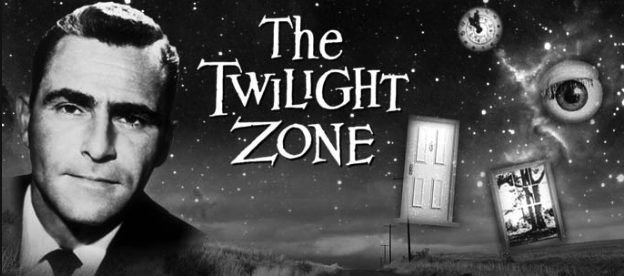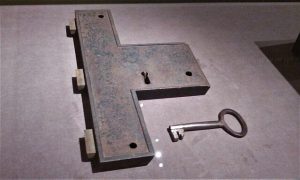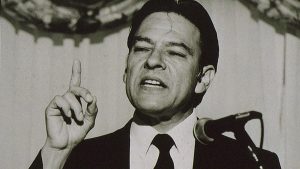I think it’s criminal that we are not permitted to make dramatic note of social evils that exist, of controversial themes as they are inherent in our society. I think it’s ridiculous that drama, which by its very nature should make a comment on those things which affect our daily lives, is in a position, at least in terms of television, of not being able to take that stand. —Rod Serling (1959)
Rod Serling, born Edwin Rodman Serling on December 25, 1924, would become one of America’s most important writers and producers of television dramas and screenplays primarily because of his vocal disapproval of censorship in the media. Before he began to seek new forms of media with minimal censorship, he was a successful writer for Playhouse 90, an American anthology drama. There, he wrote emmy-award winning scripts for “Patterns” (1955), a dramatization about corporate power, and “Requiem for a Heavyweight” (1956), which showed the struggles of a retired boxer in the aftermath of his 17-year career.1 However, it was Serling’s “A Town Has Turned to Dust” that would be his most controversial moment as part of the Playhouse 90 crew and would lead him into his next project as a writer. “A Town Has Turned to Dust” followed the story of Emmett Till, the young black boy brutally murdered in 1955 for allegedly whistling at a white woman in Mississippi. CBS decided to censor Serling’s script by making the black boy that was supposed to represent Till into a Mexican boy; they also made it seem as though it was the boy’s fault by depicting him as “getting out of line.”2 The network’s censorship removed many of the painful truths regarding the prejudices in America during this time. Serling would turn to the avenue of science fiction in order to escape this kind of censorship; in the words of Serling, “You know, you can put these words into the mouth of a Martian and get away with it.” Serling’s desire to get away from censored forms of media led to the creation of The Twilight Zone (1959-1964), a science fiction series that showcased people’s greatest fears ranging from alien invasion, death, ghosts, and even the effects of the Cold War on American society.3

Along with his criticism towards racial prejudice, Serling had his objections to the Cold War. The themes of the Cold War were largely absent from sitcoms and dramas during the 1950s; however, the episodes of The Twilight Zone, titled “The Shelter” (1961) and “Third from the Sun” (1960), discuss the effects of the Cold War head-on.4 In these two episodes, Serling brings forth the fears of the American people that were prevalent during the Cold War era (1945-1991) in terms of the overall anxiety and anticipation for a nuclear holocaust as well as the effects that the arms race had on the American psyche.
“Third from the Sun” deals more directly with the arms race and the creation of the hydrogen bomb. It was believed that the Americans were the only ones in possession of the atomic bomb; however, in 1949, the Soviets tested their first atomic bomb leading Truman to begin the quest for creating a more powerful bomb—the hydrogen bomb.5 Before the creation of this bomb, many people questioned the necessity of it. Would America win the arms race and would that be the end of it? Or would Russia create a hydrogen bomb as well? To address this question with our knowledge now, when the United States created the first hydrogen bomb in 1952, the Soviets followed suit with the creation of their first hydrogen bomb in 1955.6 Now, two nations were in possession of the world’s most powerful bomb. As Harold C. Urey stated, “Suppose that two countries have the hydrogen bomb…I would say that the probability that a war will start is increased if two groups each believe that they can win that war.”7 With the creation of the hydrogen bomb in both the U.S. and Russia, both countries were capable of obliterating the other. This is seen in “Third from the Sun” when Will Sturka, a scientist that works on hydrogen bomb production, learns from a suspicious coworker that the company planned on setting off a bomb in 48 hours. With this information, Sturka and his friend, Jerry Riden, a pilot of an experimental spacecraft, decided that it was time to move to Earth, the third planet from the Sun, in order to save their family from a nuclear holocaust. Hypothetically, we see that in the case of a nuclear holocaust, due to the mass destruction and horrors that a hydrogen bomb would produce, moving to another planet would be the best option. However, how many people have that option? Serling questions the necessity of using a hydrogen bomb because in the end, no one wins and all it brings is devastation and death.8

In relation, “The Shelter” shows the anxiety and hysteria that laid within the minds of the American people, knowing that at any moment, the enemy could drop a bomb on America and everything would change. In this episode, Dr. Stockton’s birthday party was interrupted by a radio announcement that there was a detection of a UFO, most likely missiles, en route to the U.S. and everyone is advised to seek shelter. Out of all the people present at the party, Dr. Stockton was the only one who had a shelter prepared. While everyone frantically ran to their houses to figure out what to do, Dr. Stockton and his family started to collect water, food, and things for entertainment into the shelter. The neighbors began to come back to Dr. Stockton’s house and tried to guilt him into letting them stay in his shelter with his family; however, the shelter could efficiently protect only three people. After the doctor refuses to allow any of the neighbors into his shelter, the neighbors try to break into the shelter in their last attempt to save themselves. At the end of the show, the advisory is called off and the friends of Dr. Stockton are ashamed that they put him and his family’s lives in danger because they were not prepared for a missile attack. Serling is sending a powerful message about the unpleasant aspects of human nature that can occur in life-or-death situations, as well as the importance of being prepared for this worst (even though people did not want to think about it).9

From these two episodes of The Twilight Zone, we see the ugly tendencies of human nature in regards to selfishness during a crisis in order to save one’s self, the unfortunate willingness of countries to bring another country to complete destruction via hydrogen bomb, and the importance of disaster preparedness. If Serling had tried to write these scripts for Playhouse 90, the messages would most likely have been completely distorted by the network’s need to censor material in order to protect their interests. The beauty of The Twilight Zone came from the fact that Serling could deliver powerful, uncensored messages in a half-hour span, delving into people’s worst fears and opening their eyes to the harsh reality that was bestowed upon them.

In 1964, after airing one-hundred-fifty-six episodes, The Twilight Zone was cancelled and Serling took to the lecture circuit where he delivered speeches to crowds in which he was able to speak more freely and openly. Just as Serling showed his disapproval for the Cold War in these two episodes of The Twilight Zone, he often talked about his disapproval for the Vietnam War in his lectures: “America’s destiny…lies on the streets of Newark, Miami, Chicago, Los Angeles and Harlem…not in Saigon. And certainly not at the cost of twenty-thousand dead American boys.” 10 In his lectures, Serling did not have to put these words into the mouth of a martian. Through his lectures, Serling was now able to express the emotions that so many Americans felt during times of war in a more direct way—without the necessity of crafting a masterful thirty-minute, science-fiction episode just to escape the scrutiny of media censorship.
- Encyclopedia Britannica, 2016, s.v. “Rod Serling.” ↵
- Meredith Brenner, “Thirty Minute Reality Check: How The Twilight Zone Reflected American Society in the 1950s,” (Thesis, University of Maryland, College Park, 2004), 1. ↵
- Meredith Brenner, “Thirty Minute Reality Check: How The Twilight Zone Reflected American Society in the 1950s,” (Thesis, University of Maryland, College Park, 2004), 1. ↵
- Heather Lunney, “Exploring the Cold War through The Twilight Zone: Five episodes in a journey to a dimension of sight, sound and mind,” History in the Making Vol. 3, no. 1 (2014): 40. ↵
- Richard Dean Burns and Joseph M. Siracusa, A Global History of the Nuclear Arms Race: Weapons, Strategy, and Politics 2 Volumes: Weapons, Strategy, and Politics (Santa Barbara, CA: Praeger, 2013), 37. ↵
- Richard Dean Burns and Joseph M. Siracusa, A Global History of the Nuclear Arms Race: Weapons, Strategy, and Politics 2 Volumes: Weapons, Strategy, and Politics (Santa Barbara, CA: Praeger, 2013), 34. ↵
- Harold C. Urey, “Should America Build the H-Bomb?,” Bulletin of the Atomic Scientists, March 1, 1950, 73. ↵
- “The Shelter,” The Twilight Zone, directed by Lamont Johnson (Los Angeles: CBS, 1960). ↵
- “The Shelter,” The Twilight Zone, directed by Lamont Johnson (Los Angeles: CBS, 1961). ↵
- Rod Serling (lecture presented at Moorpark College, Moorpark, CA, December 3, 1968). ↵



76 comments
Isabella Lopez
This is so perfect! I was waiting to read this one. I use to watch the Twilight Zone when I was a kid and I adore the ride in Hollywood Studios. I think you covered the anxiety ridden time in depth relatively well. Rod was bold to venture into this genre and insightful for linking it to the events of that time.
Iris Reyna
Good job on the article Mariana, it was informative and educational and was put together nicely. It did a good job of showing the effect the media had on the war. The Twilight Zone was an interesting but weird show to me, but it was intended that way because he was calling attention to issues and ways to deal with them ourselves. It’s really fascinating. And to learn that Rod Serling was not only the narrator but the writer of the show was really interesting. Good Job.
Lyle Ballesteros
I have heard about the Twilight Zone before and how important it was but I had never watched it before. Thsi article makes me too not only watch those two episodes you highlighted about the Could War but potentially the enire show. Serling’s impact seems huge on censorship in American media and without the Twilight Zone we may have been slower in our progress of lowering censorship in media which still exists today.
Victoria Castillo
Interesting article! I’ve never heard of Edwin Rod Serling so learning about who he was and what he did was very interesting, especially since he seemed so passionate of censoring media less during the 1950’s-60s. For The Twilight Zone I’ve only ever heard mentions about the kind of show it was, but to learn that it used the main fears of the people during that time to represent the shows is just phenomenal.
Isabel Soto
This is a very interesting article. I had to go back and watch some of the twilight zone episodes. It brought more understanding to the article. he is such a hero for trying to stand up for what is right. I loved how this article was able to capture the anxiety and problems that were happening during that time. therefore this article was very informational.
Olivia Lauer
I was really intrigued reading this! It was full of so much information that I didn’t know about. You did a terrific job at portraying the episode. I didn’t watch Twilight Zone growing up but it gave me a new perspective to go about now knowing what was happening. Especially the pictures you included in the article. Good job on your publication!
Gabriella Galdeano
I found this article very interesting. It was well written, and I liked the pictures that were included from episodes of The Twilight Zone. The media during the Cold War tried to shelter the public and ignore the tension between the Soviet Union and the US. Rod Serling had to be creative and venture into the science fiction genre just to express his views on the Cold War.
Sierra Christa
I loved the images you put throughout this article! I had little knowledge about the background to the Twilight Zone and I feel that you brought to life the story behind the show. This article did a great job of showing how those two episodes specifically highlighted the fear and paranoia the american public felt during this time.
Tabitha Babcock
Great article! I had to watch an episode of The Twilight Zone for an English class once, and I remember really liking it. It takes on even more meaning to me now knowing that Rod Sterling was a really cool guy who used the science fiction genre to speak more freely on current events. I really liked the quote you included from him, “You know, you can put these words into the mouth of a Martian and get away with it.” He had a pretty grim outlook on human nature, but I suppose that can be forgiven due to the time frame.
Jacob Anthony Ayala
This was a very fun and interesting article to read! I’ve heard of the Twilight Zone show but never really knew what it was about. But learning that it has a lot to do with the writer expressing his political opinion is really interesting. But the shoe captured what it felt like to live during that time and was very informational.